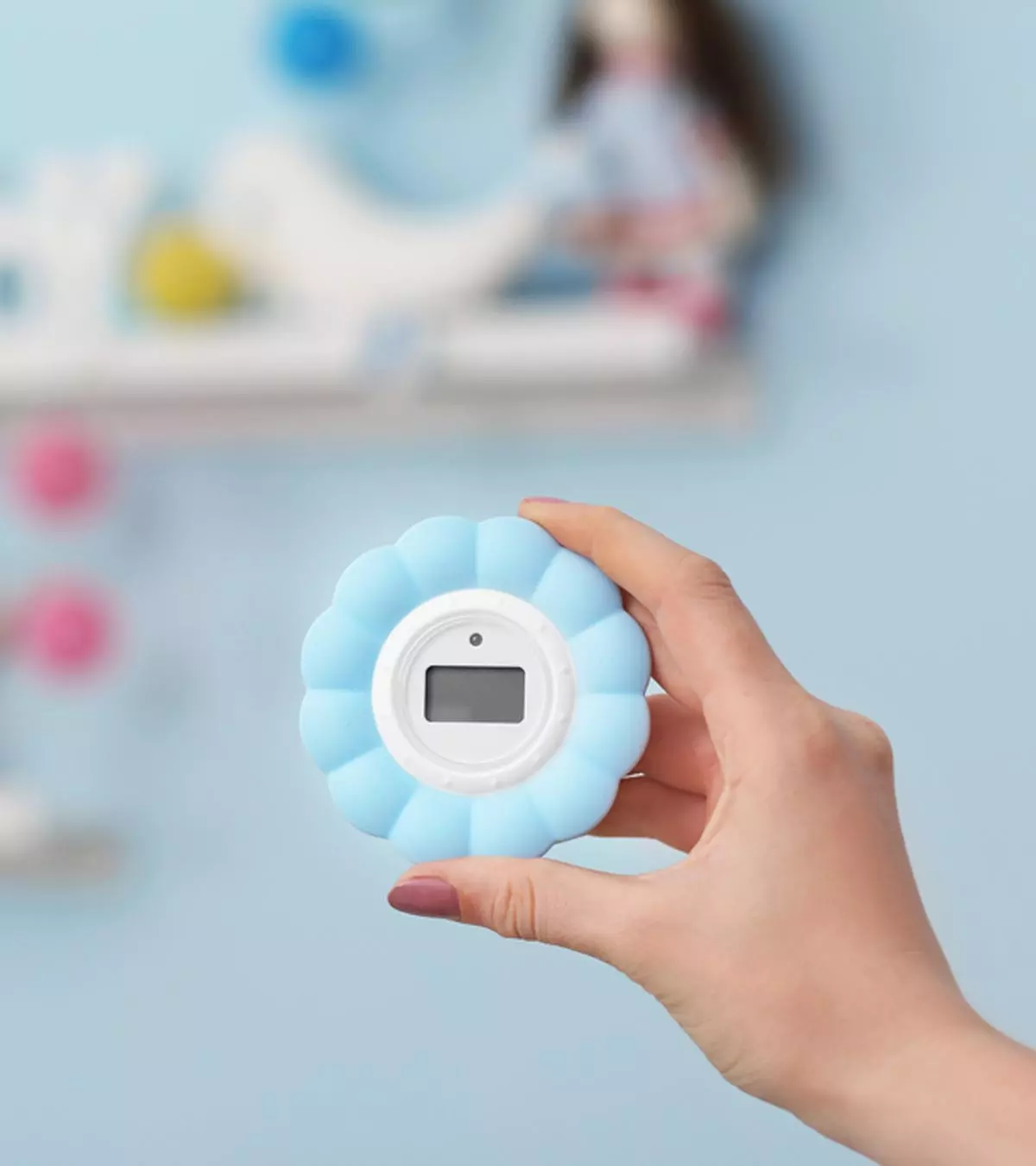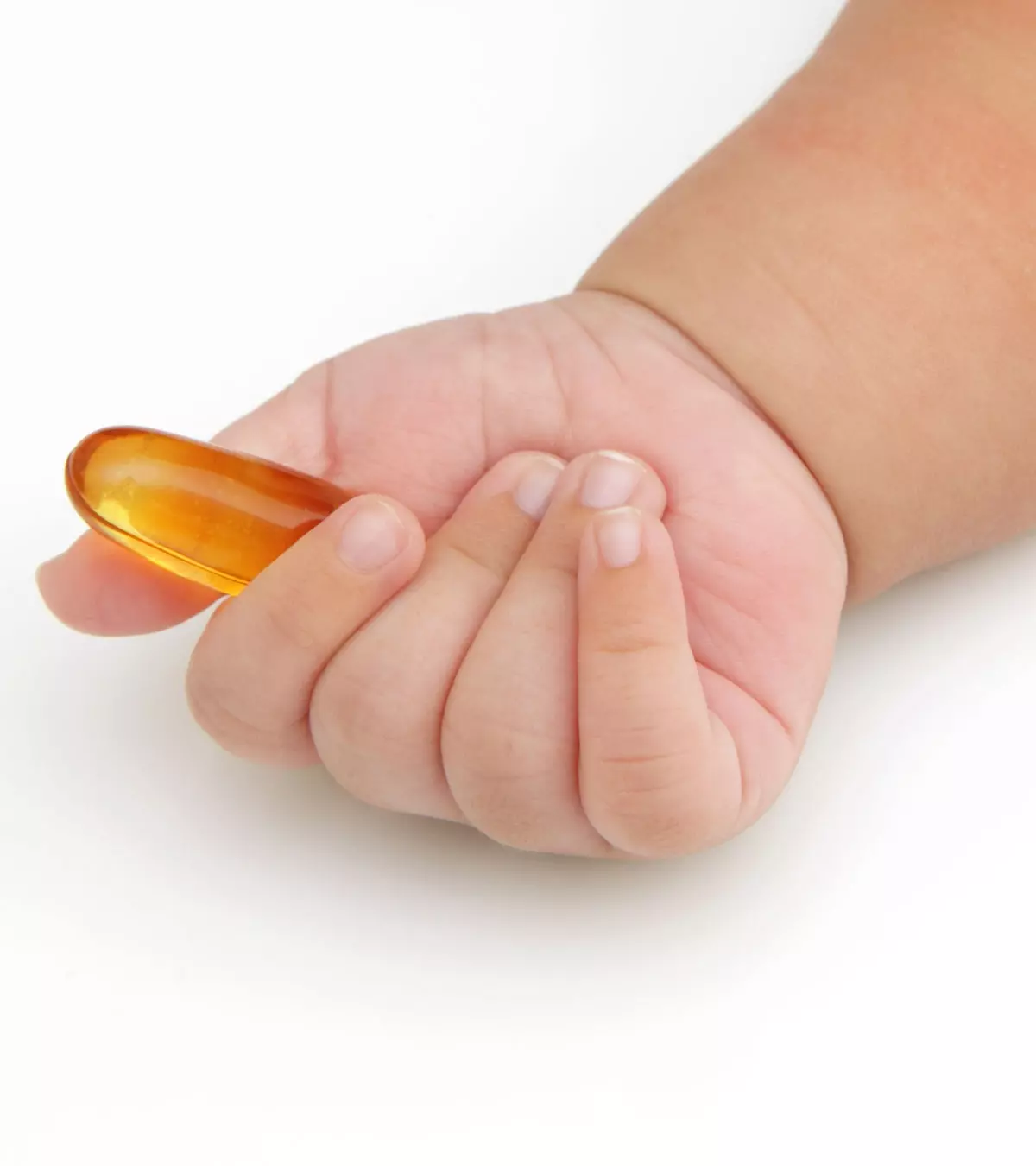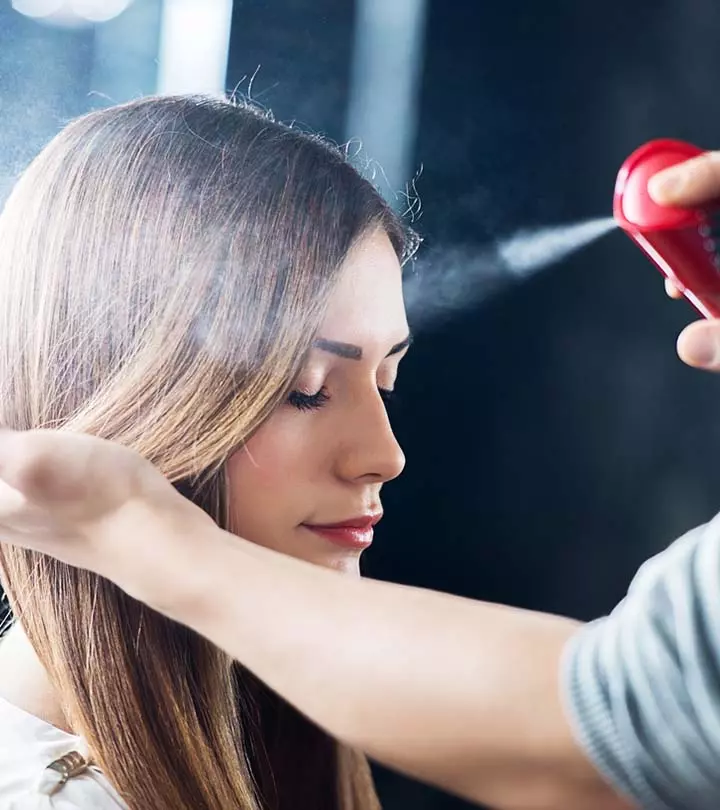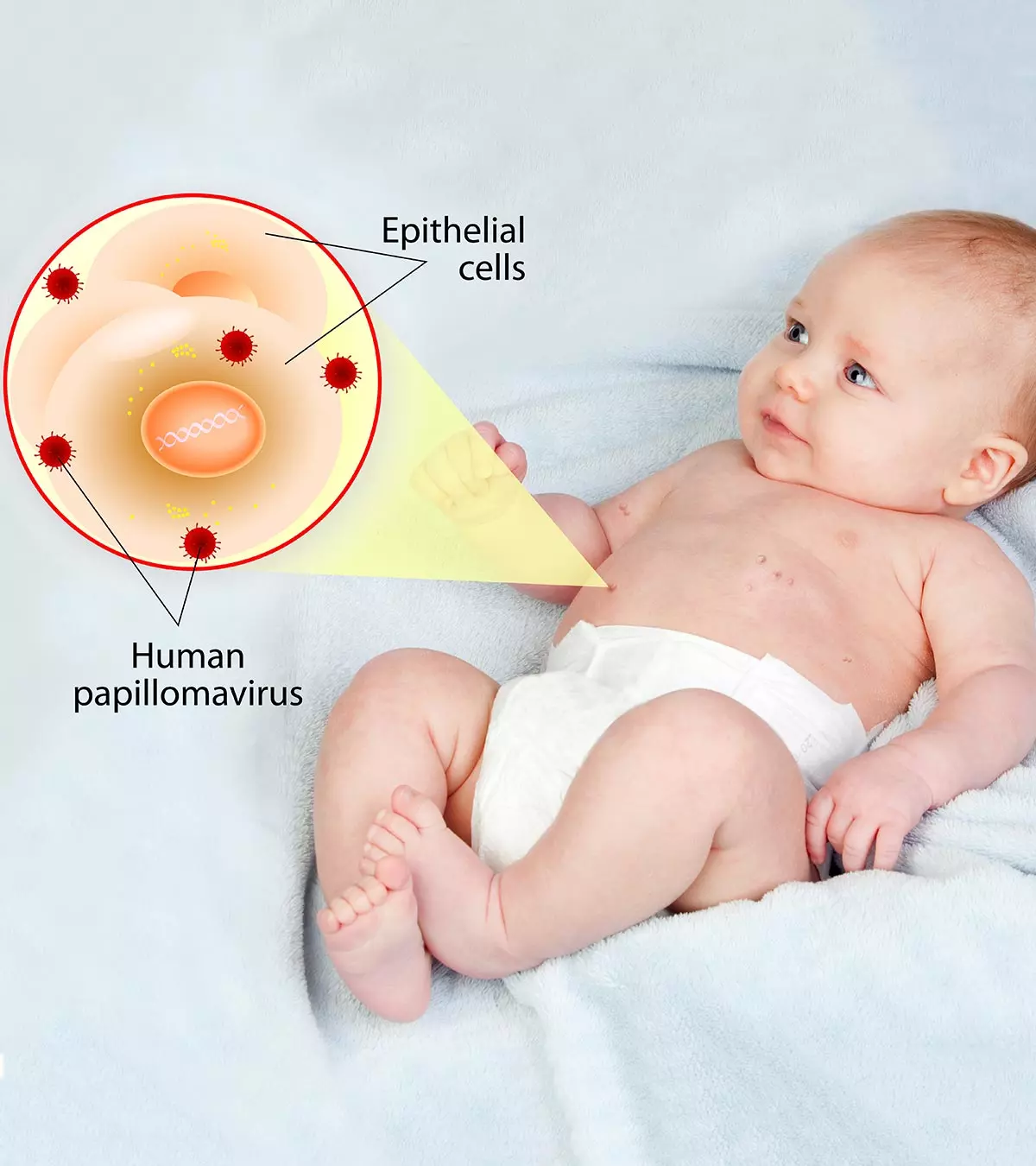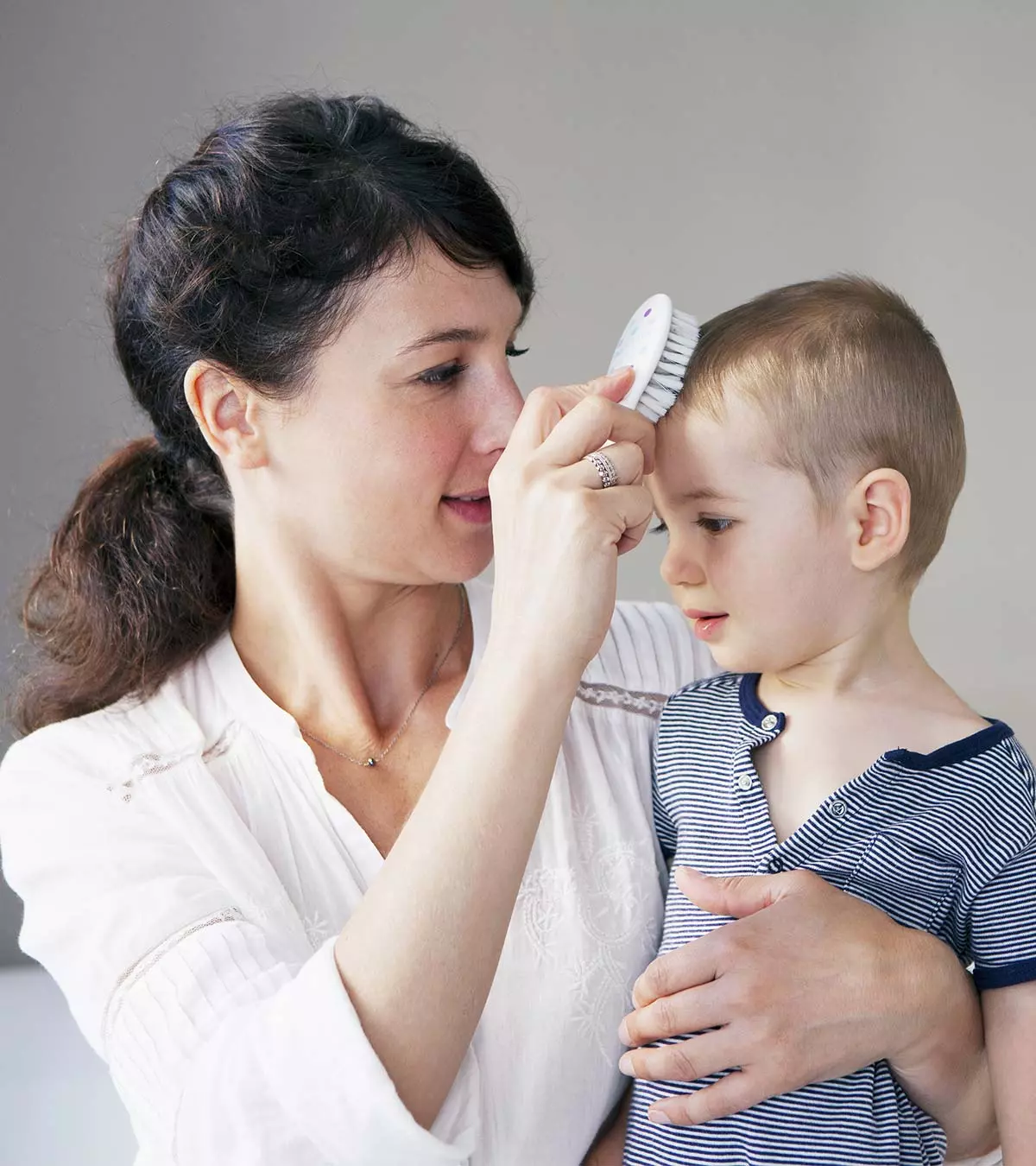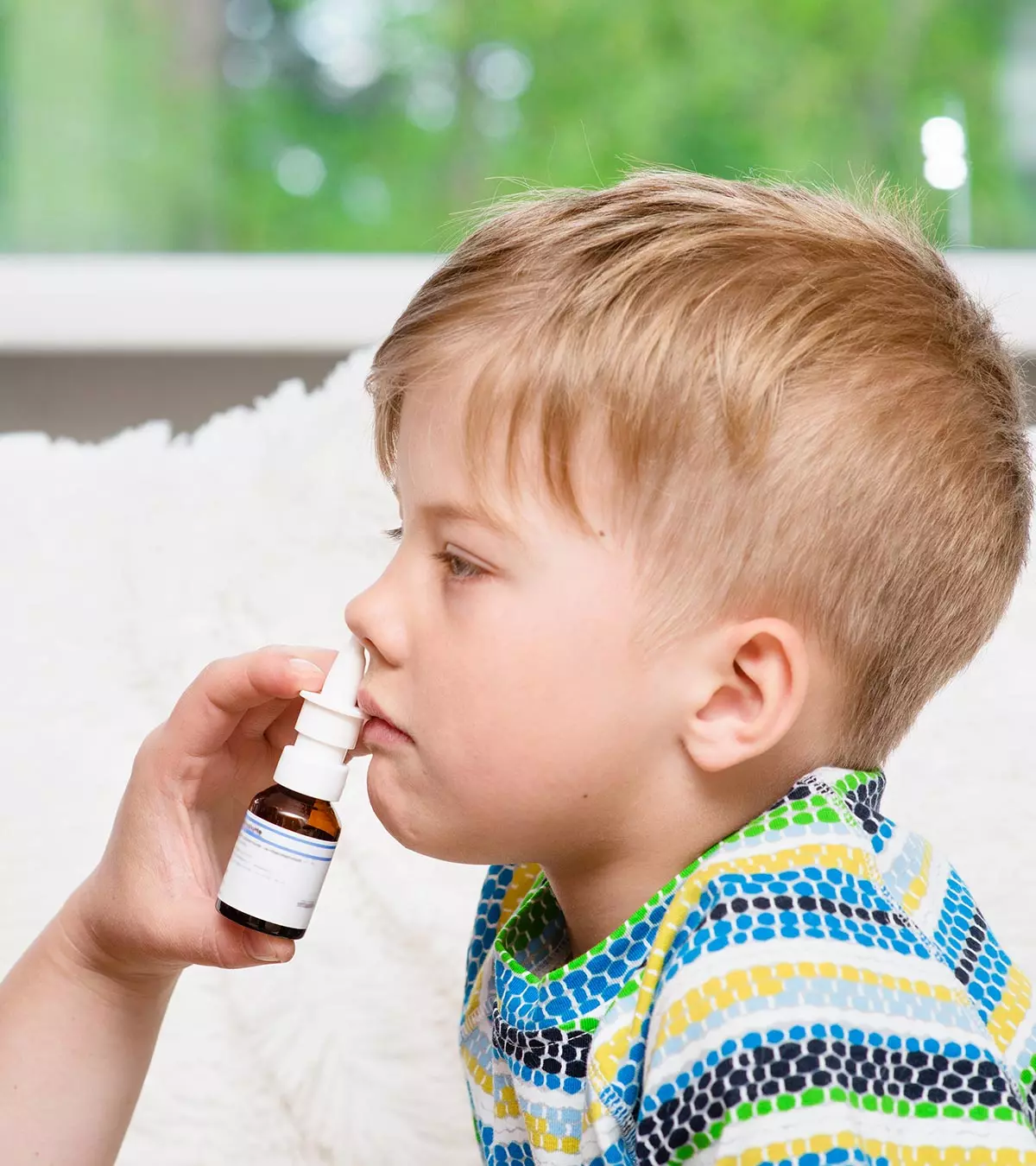
Image: ShutterStock
Parents commonly use nasal sprays for kids to help them when they are congested and experience a blocked nose. Nasal sprays are available as over-the-counter (OTC) drugs at pharmacies. Although nasal sprays are available OTC, it is important to know their safety, including the dosage and types, according to the child’s age and general health. Read on to know the types of nasal sprays for children, ways to administer, side effects, and more.

Key Pointers
- Nasal congestion usually leads to breathing difficulties due to blockages in the nasal passage.
- To help deal with this condition, children can use nasal sprays.
- Following the proper steps while administering nasal spray to children is essential to avoid unwanted injuries.
- However, ensure you administer such medications only after consulting with a doctor.
What Is Nasal Congestion?

Nasal congestion is a condition characterized by difficulty in breathing due to the blocked nasal passages. It is also called nasal obstruction. Nasal congestion can occur due to various reasons. Rhinorrhea (runny nose) is one of the common causes (1).
Any inflammation in the nasal lining can also cause nasal congestion. Inflammation leads to swelling of the blood vessels in the nasal lining, thus reducing the space within the nasal airway and making it difficult to breathe (1).
The following are common causes of nasal obstruction (1) (2):
- Viral or bacterial infections
- Seasonal allergies like those in the flu season
- Common cold and flu
- Infections of sinuses (sinusitis) and adenoids
- Allergic rhinitisiInflammation or swelling inside the mucous membrane of the nose
- Non-allergic rhinitis
- Pollution
- Chemical irritants such as perfume or tobacco smoke
- Deviated nasal septumiA condition where the nasal septum is misaligned to one side, usually due to an injury
- Some medications
- Certain medical conditions like tumors, nasal cysts, and nasal polypsiBenign, painless growths inside the lining of the nasal cavity , in children
What Is A Nasal Spray?

Nasal sprays are solutions or suspension of medicines used for the local administration of a drug by spraying it into the nostrils.
Depending on the underlying condition, the doctor may prescribe a nasal spray that may contain steroids, antihistamines, mast cell inhibitors, or other compounds.
 Did you know?
Did you know?Are Nasal Sprays Safe For Children?
The American Academy of Pediatrics (AAP) recommends against using OTC cough and cold medicines for children. Instead, it recommends saline nasal drops, among various other safe treatment modalities (3).
Saline nasal drops or saline spray is usually considered to be safe for kids (4). The Calpol saline nasal spray is one such commonly used brand. However, it is good to consult a doctor before using any saline nasal spray.
Oxymetazoline nasal sprays are not recommended for children under the age of six years unless prescribed by the doctor. The spray should also be used as per doctor’s prescription (5).
Nasal sprays for kids are usually recommended to be used as a single dose per day.
Dr. Sonia Cajigal, a board-certified allergist and immunologist from St. Louis, Missouri, says, “Children’s Afrin (Oxymetazoline HCL) is a nasal spray that can be used for severe nasal congestion associated with colds. This type of nasal spray is only recommended for three days consecutively. If used regularly longer than this, it can cause increased nasal congestion, leading to dependence on the medication.”
 Quick fact
Quick factTypes Of Nasal Sprays
The following are the different types of nasal sprays available for congestion (6) (7).
1. Nasal steroid sprays
Dr. Cajigal suggests, “For daily nasal congestion from allergies, nasal steroid sprays (such as Flonase, Nasacort, Rhinocort) are recommended. These are slow acting, safe, and should be used daily to be effective. Mild nosebleeds can occur due to these nasal sprays. However, it is rare for them to cause long-term nasal damage.”
They are often the first line of therapy for allergies and work by decreasing inflammation of the nasal passages. Most of them are available over-the-counter, but it is recommended to use them only as suggested by the doctor. Do not use them beyond the permitted time.
In the case of nasal allergies of the nose, such as hay fever or long-standing rhinitis, the doctor might prescribe a steroid nasal spray. Local application of steroids in the form of the nasal spray works well by reducing the inflammation in the nose (8).
The following drugs are usually present in the nasal steroid sprays:
- Flunisolide
- Fluticasone Propionate
- Ciclesonide
- Budesonide
- Beclomethasone Diproprionate (dry nasal spray)
2. Nasal antihistamine sprays
are usually prescribed for allergies and mostly used for runny nose. These sprays often leave a bitter taste in the mouth after administration.
The following drugs are present in the antihistamine sprays.
- Azelastine
- Olopatadine
3. Anticholinergic nasal sprays
Used for treating runny nose in children with both allergic and non-allergic rhinitis, the medicine reduces nasal discharge but may cause dry mouth and bad taste. Ipratropium Bromide is the commonly used drug in anticholinergic nasal sprays.
4. Mast cell inhibitors
Cromolyn sodium is a mast cell inhibitor and helps in reducing symptoms of nasal congestion, sneezing, and runny nose. Nasal burning and a bad taste in the mouth are the commonly seen side effects.
5. Nasal saline sprays
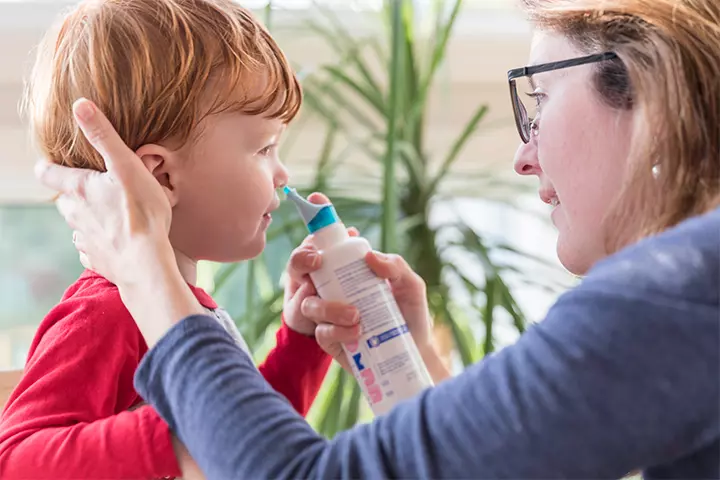
These are commonly available and are relatively safe for children. However, consult a doctor before buying any OTC saline drops since they may contain added medicines.
Do not use any non-prescription medications or sprays for your kids’ congestion relief. Use a prescribed nasal spray as per doctor’s prescription. Extended usage beyond the prescribed duration can cause complications.
How To Administer Nasal Spray To Kids?

Parents can follow these steps while administering nasal spray to children (9).
- Wash your hands.
- Shake the bottle well before use.
- Get your child in the correct position by making them sit with their head tilted back. Alternatively, the child can lie on the floor and keep their head tilted back. If needed, place a pillow under the child’s neck to make it easier for them to tilt their head.
- You may wrap younger kids in a blanket or a sheet to keep their hands and feet still. You may also take the help of someone to hold the child in position.
- Spray the recommended quantity of nose spray by aiming the nozzle towards the outer wall of the nostril. Clean any excess medicine outside the nose with a tissue.
- Let the child remain in the same position for a few minutes.
- Tightly cap the bottle of the spray and keep it safely away from the child’s reach.
 Quick tip
Quick tipIf your child’s doctor recommends an alternative method of administration, follow their instructions.
Read all instructions on the spray and the ones given by the doctor before administering the spray. Be gentle while inserting the nozzle into the nose to prevent any injuries. Talk the child through the process to make them more comfortable and compliant.
Side Effects Of Nasal Spray For Children
The following are the possible side effects of nasal sprays in kids (10).
- Medication dripping down the throat and causing throat irritation
- Bad taste
- Dry nose
- Nosebleeds

Bitter taste and medicine dripping down the throat can be managed by keeping the child in the correct posture when administering the nasal spray.
Nasal sprays usually do not have any side effects. However, if the child develops allergic symptoms such as rash, itching, breathlessness, swelling, severe dizziness, or nosebleeds, or any other unusual symptoms, then discontinue the use and contact your healthcare provider.
Can Allergic Nasal Sprays Affect A Child’s Growth?
A few studies have been done to check the effects of nasal decongestant sprays on skeletal growth and adrenal activity. One randomized control study done on a group of children using mometasone steroid nasal spray for a year showed no adverse effect on their skeletal growth (11).
Another study conducted over a long period concluded that nasal corticosteroid did not affect the growth of kids, who used it over a period of three years (11). However, research on about 90 children of the age group of six to nine years yielded different results. They were treated with a steroid called beclomethasone and showed suppressed growth when compared to children who were not taking the drug (11).
There are mixed results regarding the use of steroid-based nasal sprays for children. Therefore, these medicines should only be used under medical supervision and only for the prescribed period. Your child’s pediatrician will weigh the risks versus the benefits before prescribing these sprays for any underlying medical conditions.
The following chart depicts bioavailability, which refers to the fraction of a drug that enters the bloodstream and produces an effect of various nasal corticosteroids. The data suggests beclomethasone, budesonide, triamcinolone, flunisolide, and betnesol have higher bioavailability than newer drugs such as fluticasone and mometasone. This disparity in bioavailability may be a factor in why the latter medications are less likely to impact children’s growth.

Bioavailability of nasal corticosteroids
Source: Paediatric rhinitis: position paper of the EuropeanAcademy of Allergy and Clinical Immunology; AllergyFrequently Asked Questions
1. Are there any alternatives to nasal sprays to relieve nasal congestion in a child?
Yes, you may try other methods to relieve nasal congestion in children. These are (12):
- Raise their head with the help of a pillow while sleeping
- Use cool-mist vaporizer
- Let them sit in a steamy bathroom for some time
- Don’t smoke near a child who has congestion
2. Do nasal sprays affect the sleep of a child?
Yes, research shows that nasal spray may help children with mild apnea to sleep better by reducing inflammatory cell proteins (13) (14).
3. Can nasal spray be used for treating post-nasal drip in children?
Nasal sprays can aid children with post-nasal drip, but seeking guidance from a healthcare professional is advisable. They can evaluate your child’s illness, determine the underlying reason, and offer pertinent advice on using nasal sprays or other available treatments (17).
Pediatricians may prescribe nasal spray for kids to relieve nasal congestion or obstruction. Bacterial or viral infections, allergies, chemicals, and pollution can cause stuffy noses. Nasal sprays are solutions of medications that can be sprayed into nostrils. Saline solutions in the form of nasal sprays and drops are safe and more effective for children than medicated sprays. You may use medicated sprays only with a prescription since it may cause complications in children. Avoid OTC nasal sprays for kids and always read labels to ensure that the sprays are safe for your child’s age.
Infographic: How To Administer Nasal Spray To Children?
Nose blocks can be uncomfortable and interfere with the child’s daily routine and proper sleep. So you may use nasal sprays for quick relief if recommended by your pediatrician. But since children may not know how to use it safely and poke too deep, here is a tutorial on administering the spray correctly. Illustration: Momjunction Design Team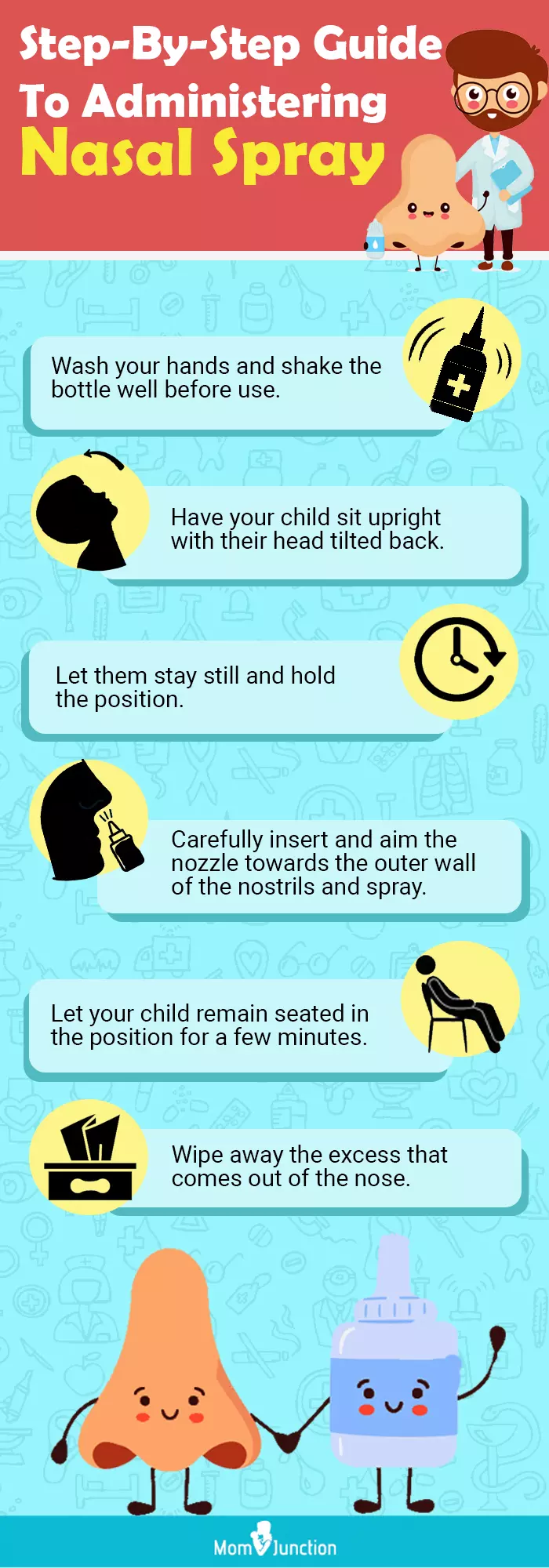
Illustration: Nasal Sprays For Kids: Is It Safe Types And Side Effects

Image: Stable Diffusion/MomJunction Design Team
Nasal sprays are generally child-friendly and very easy to use if your child is aware of how to use them appropriately. This video may help your child learn how to comfortably use these sprays.
References
1. Nasal Obstruction; Stanford Children’s Health
2. Congestion, Stuffy Nose, & Nasal Obstruction; Medical University Of South Carolina
3. Take Care with Nasal Sprays; University of Rochester Medical Center Rochester
4. Use Caution When Giving Cough and Cold Products to Kids; U.S. FOOD AND DRUG ADMINISTRATION
5. Oxymetazoline Nasal Spray; US National Library Of Medicine
6. Nasal Sprays; American Academy of Allergy, Asthma & Immunology.
7. You Want Me To Spray What Up My Nose?; The American Academy Of Otolaryngic Allergy
8. Steroids; NHS; The National Health Service
9. How to give your child nose ointment, drops or spray: information for families;; NHS
10. Eli O. Meltzer et al, Burden of allergic rhinitis: Results from the Pediatric Allergies in America survey; the Journal Of Allergy and Clinical Immunology
11. DENISE K. SUR, MD, and STEPHANIE SCANDALE, Treatment of Allergic Rhinitis; American Family Physician
12. Nasal Congestion (Infant/Toddler); Fairview
13. Obstructive Sleep Apnea; KidsHealth
14. Junhu Tai et al.; Different Methods and Formulations of Drugs and Vaccines for Nasal Administration; NCBI
15. Live Attenuated Influenza Vaccine [LAIV] (The Nasal Spray Flu Vaccine); CDC
16. Using a Nasal Spray for your Child; Nationwide Children’s Hospital
17. Post-nasal Drip; ENT health
Community Experiences
Join the conversation and become a part of our nurturing community! Share your stories, experiences, and insights to connect with fellow parents.
Read full bio of Dr. Wayne Hough
- Dr. Sonia Cajigal is a board-certified allergist/ immunologist, practicing for seven years. She attended medical school at the University of Missouri-Kansas City School of Medicine and trained around the midwest (Kansas City, Cleveland, Detroit) before settling down back in her hometown of St. Louis, Missouri where she started her own practice.
 Dr. Sonia Cajigal is a board-certified allergist/ immunologist, practicing for seven years. She attended medical school at the University of Missouri-Kansas City School of Medicine and trained around the midwest (Kansas City, Cleveland, Detroit) before settling down back in her hometown of St. Louis, Missouri where she started her own practice.
Dr. Sonia Cajigal is a board-certified allergist/ immunologist, practicing for seven years. She attended medical school at the University of Missouri-Kansas City School of Medicine and trained around the midwest (Kansas City, Cleveland, Detroit) before settling down back in her hometown of St. Louis, Missouri where she started her own practice.
Read full bio of Dr. Ritika Shah
Read full bio of Swati Patwal
Read full bio of Ghazia Shah






